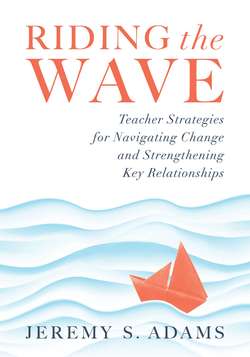Читать книгу Riding the Wave - Jeremy S. Adams - Страница 21
На сайте Литреса книга снята с продажи.
The Benefits of Self-Care
ОглавлениеTeachers need to understand that self-care is not indulgent. In fact, it is the height of professionalism for a simple reason: when teachers are not at their best, our schools will not be at their best. When schools do not function in an optimal fashion, our students will not reach their full potential. Thus, responsible professional development must include a robust conversation about self-care. According to teacher and college instructor Jennifer Gonzalez (2017), far too many educators associate self-care with self-indulgence or professional weakness; they often feel guilty when they admit they need more information about self-care. Rather than seek this information, they maintain unproductive, strenuous work habits. As she writes in her popular blog Cult of Pedagogy, “Too many teachers have reached the conclusion that this [unhealthy] lifestyle is just part of the job; there simply isn’t enough time to be a good teacher and take care of yourself” (Gonzalez, 2017).
Professor Keith Herman, doctoral student Jal’et Hickmon-Rosa, and professor Wendy Reinke (2018) note in a prominent study, “Teacher stress and burnout are significant problems that affect our schools. Finding innovative and impactful ways to improve outcomes for students by supporting teachers may make a significant contribution to society” (p. 98).
When teachers thrive emotionally, physically, and psychologically, the list of positive consequences is almost limitless. Consider that when students describe the qualities of effective teachers, they commonly observe that these teachers seem to enjoy what they are doing (Urban, 2008). The teachers want to be in the classroom. The classroom rejuvenates them. In short, the best teachers derive genuine joy and purpose from their interactions in the classroom (Adams, 2016). Self-care makes for more positive and productive classroom teachers—which makes for more positive and productive students.
Data confirm that when teachers feel good about themselves and their profession, they are more likely to provide a high-quality education to their students. Trauma consultant William Steele (2017), for example, has argued that teachers who eagerly practice self-care are far more likely to be proactive in reacting to both student challenges and overall challenges of the educational system. Self-care gives teachers the tools they need to effectively cope with the difficult circumstances of 21st century education.
NOTICE the WAVE
Do school staff talk about self-care at your school? If so, does it seem like a perfunctory conversation, or do both administrators and teachers take it seriously? If staff haven’t brought up self-care, how do you think your colleagues would react to the topic?
